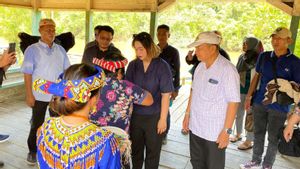JAKARTA - The economic blow due to the COVID-19 pandemic has made Singaporeans worried about having children. For this reason, the Singapore government offers incentives so that prospective parents do not worry too much about costs.
Singapore's Deputy Prime Minister and Finance Minister Heng Swee Keat said the incentives would help reassure people who are facing financial stress and are worried about their jobs.
"We have received feedback that COVID-19 has caused some prospective parents to delay parenting," Heng Swee Keat told lawmakers. "This is very understandable, especially when they face income uncertainty," he added.
Quoting CNN, Wednesday, October 7, Heng said the payment will help parents who are struggling with money due to the COVID-19 pandemic. But he did not confirm the amount of money to be given. Indeed, Singapore is one of the countries responsive to health threats during a pandemic, but from an economic point of view the Lion Country is hit by a deep recession.
Singapore's Gross Domestic Product (GDP) is predicted to shrink 12.6 percent in the second quarter compared to the same time a year earlier. It was recorded as the sharpest economic downturn in history according to Singaporean economists.
Low birth rateAccording to data cited by CNN, Singapore is one of the countries with the lowest birth rate in the world. Noted, the fertility rate in Singapore is currently only 1.14 births per woman.
That figure parallels Hong Kong, according to the World Bank. But it's not the lowest, there are still South Korea and Puerto Rico which have lower birth rates.
In order for the country's population to replenish naturally, women must have an average of 2.1 babies. However, most developed countries are below that level, due to a decrease in the proportion of partners and a reduction in traditional gender roles. This causes fertility rates to drop globally.
Singapore has struggled to reverse trends since the 1980s, with public campaigns encouraging childbirth and a number of financial and tax incentives. But these programs have not been able to stop the decline in the number of births.
"Like many developed countries, the main challenges to Singapore's population are low fertility and an aging population," wrote the Singapore government's statistics report (2011). "Our goal is to achieve a sustainable population that supports economic growth and social cohesion, so that Singapore remains vibrant and livable."
To note, Singapore has now made it through the worst pandemic. Early in the pandemic, his government was responsive to isolating people under surveillance, enforcing strict lockdowns and using technological innovations to speed up patient contact tracing. Only 27 people have died from COVID-19 in Singapore, according to Johns Hopkins University.
The English, Chinese, Japanese, Arabic, and French versions are automatically generated by the AI. So there may still be inaccuracies in translating, please always see Indonesian as our main language. (system supported by DigitalSiber.id)









